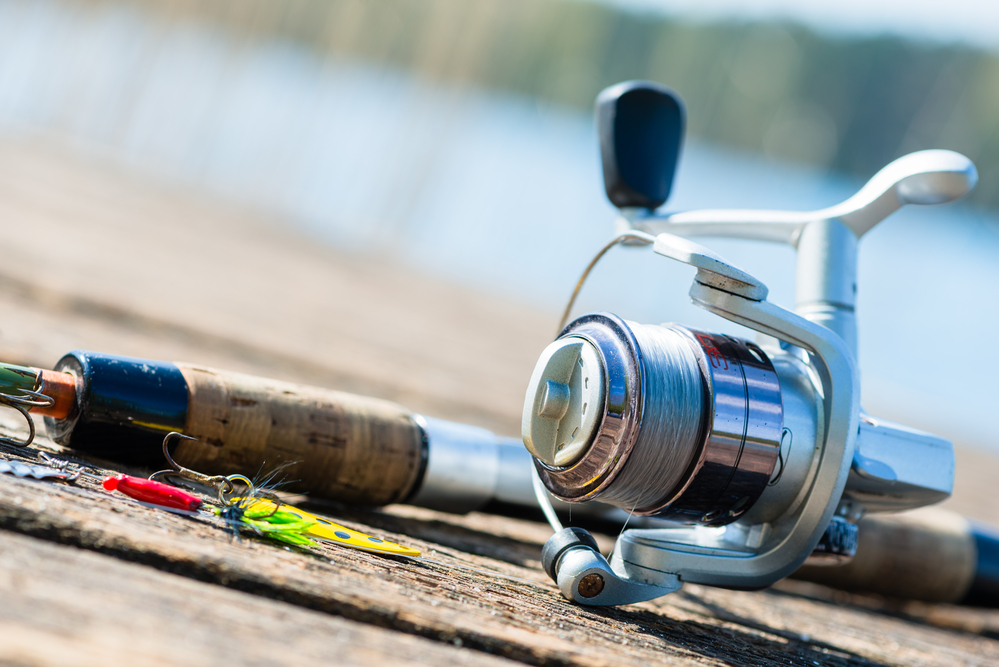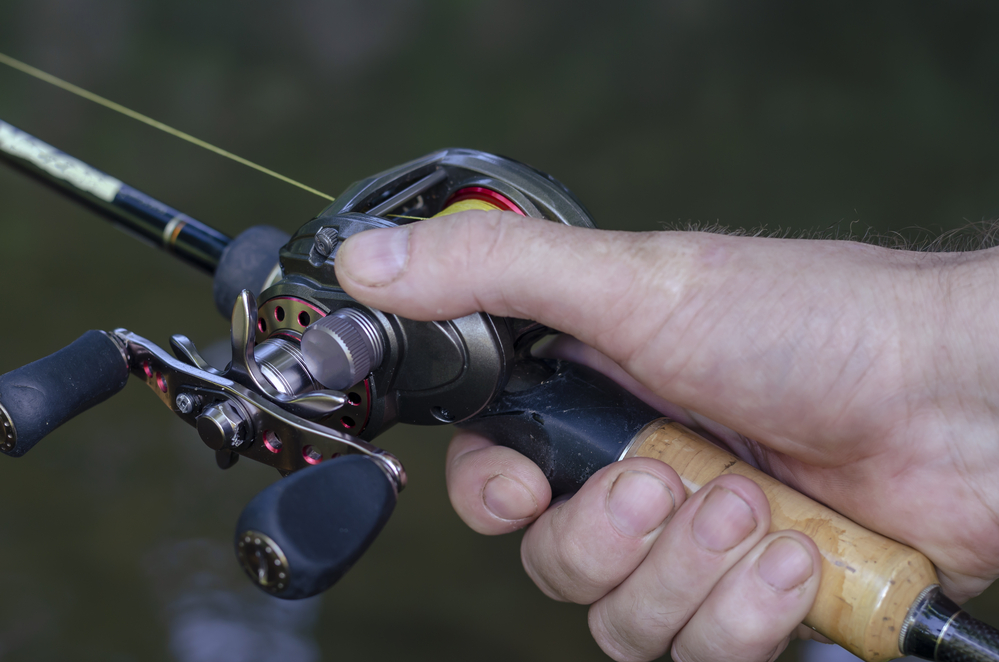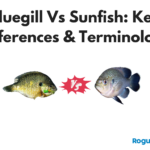Out on the water, your rod is your most trusted companion!
It can be tough to choose what your ideal rod will be in any given situation, which is why this article is here to help you make the right decision.
Spinning and casting rods are two essential tools for any angler trying to land their next big trophy fish.
These rods have various characterizations and strengths, so to help you navigate which rod to choose, we’ll discuss:
- What a spinning and casting rod is, respectively
- The benefits of each type of rod
- The differences between the two
- Whether the spinning or casting rod is best for you.
Let’s get into it!
What is a Spinning Rod?

A spinning rod is a fishing rod designed to be used with a spinning reel. These rods are designed with a straight handle and guide that faces downward, which means the line can flow easily off the reel.
In contrast to casting rods, which require the angler to push a button or use a lever to release the line, spinning rods use a bail system to control the flow of the line.
The use of a bail system makes the rods more versatile, easier for beginners, and much more versatile for various types of fishing.
In terms of size and power, spinning rods can vary! The rods go from ultralight for small fish to heavy-duty rods for big-game fishing.
So, whether you’re heading out fishing for trout in a small stream or going for a trophy marlin, the spinning rod is an all-rounder tool to help you get that once-in-a-lifetime catch.
What is a Casting Rod?
A casting rod can also be referred to as a baitcasting rod, designed to be used with a baitcasting reel.
Compared to spinning rods, which feature a downward-facing guide, casting rods have upward-facing guides that prevent the line from tangling during casting.
These rods tend to be stiffer and more powerful than spinning rods. The stiffness makes them ideal for catching bigger fish or casting weightier lures.
With this in mind, casting rods can be more difficult for beginners as they require a certain level of skill and finesses to cast accurately.
However, don’t let that prevent you from using this rod! If you’re looking for a rod that can handle bigger fish and heavier lures, the casting rod will be a perfect addition to your days on the water.
What Are The Benefits Of A Spinning Rod?
Applicable for different fishing techniques
Spinning rods are incredibly versatile! These rods can be used in a broad range of fishing styles. This means the spinning rod will allow you to cast lures, use live bait, or finesse fish.
Great for beginners
These rods are usually recommended for beginner fishermen as they are much easier to navigate than casting rods.
The spinning reel on the rod is incredibly functional and direct; this means the user will experience much less backlash or tangling. This means the rod is much more forgiving for novice anglers.
Allows for long casting distances
Casting lures and bait over longer distances is much easier on spinning rods. The greater casting distance is down to the reel’s design. The rods’ more extensive guides help reduce friction along the line, which increases the length of the cast.
Suitable for light to medium-sized fish
In terms of light to medium-sized fish, the spinning rod will provide both essential sensitivity and flexibility that will not scare fish off the line.
These rods are better suited for catching fish of this size, including trout, panfish, and bass.
Great for finesse presentations
This reel type is excellent in finesse fishing, where accurate presentations are essential. Anglers can utilize lighter lines and finesse lures to tempt fish that may be more picky.
Less likely to tangle or backlash
When opposed to casting rod gear, one of the significant advantages of these rods is the lower chance of backlash or line tangles.
This makes the rod more dependable, especially when fishing with a novice or under challenging circumstances.
Sensitive to bites and strikes
Spinning rods are known for their sensitivity, allowing fishermen to detect a fish’s faintest nibbles and strikes. The rod’s sensitivity improves the hook-setting precision, increasing your chances of catching a fish.
Benefits of a Casting Rod?

Better accuracy in casting
Casting rods are great for fishermen who need to make accurate casts to specific fish, as the rods have a high casting accuracy.
The precision of these rods is critical when pitching, turning, and targeting any lurking fish.
Suitable for heavier lines and lures
The rods are built to handle weightier lines and lures properly. They can cast and retrieve larger baits and lines with ease. This makes them ideal for targeting larger fish.
Strong backbone for handling large fish
Casting rods feature a robust backbone, allowing fishermen to handle and control more significant and heavy rfish. The power of these rods means you can catch large fish without a problem.
Ideal for power and precision casting
Casting techniques such as long-distance casting and power fishing approaches are the key benefits of these rods. Further, these rods have the ability to cast heavier lures.
Has better control over lure placement
When you’re using a casting rod, you’ll be able to have more control over your lure placement. This added control means you can place the bait precisely where you want it.
Can handle heavy cover and vegetation
Casting rods are ideal for fishing in dense cover/foliage and structures. The power and control of these rods mean you can get through any obstacles and catch fish under challenging conditions.
Versatile for different fishing techniques
Both rods are known for their strength, precision, and adaptability. However, the casting rod is recommended if you want to tailor your fishing toward specific techniques such as flipping and pitching.
Suitable for setting the hook quickly
Casting rods allow the users to set up fast and precise hook setups. Using this rod, you can set the hook quickly and effectively when you sense a bite – which ultimately means more fish are caught!
What Are The Differences Between A Spinning Rod And A Casting Rod?
| Spinning Rod | Casting Rod | |
| Design | Designed for use with a spinning reel. | Designed for use with a baitcasting reel. |
| Line Guide Orientation | Downward-facing guides to allow line flow. | Upward-facing guides to prevent line tangling during casting. |
| Versatility | Versatile, suitable for various fishing techniques. | Versatile, recommended for specific techniques like flipping and pitching. |
| Beginner-Friendly | Great for beginners due to ease of use and forgiving nature. | May be more challenging for beginners due to the learning curve. |
| Casting Distance | Allows for longer casting distances with reduced friction. | Offers high casting accuracy but may not achieve long distances. |
| Fish Size | Suitable for light to medium-sized fish. | Ideal for handling larger fish. |
| Finesse Fishing | Excellent for finesse presentations with lighter lines. | Better suited for power fishing with heavier lures. |
| Tangling/Backlash | Less likely to tangle or backlash, providing reliability. | Requires skill to avoid backlash during casting. |
| Sensitivity | Sensitive to bites and strikes for precise hook-setting. | Offers control over lure placement for accuracy. |
| Lure Placement | Limited control over lure placement. | Provides precise control over bait placement. |
| Handling Cover | Not ideal for heavy cover and vegetation. | Suitable for fishing in dense cover and structures. |
| Setting the Hook | May require more finesse in hook setting. | Allows for fast and precise hook setups. |
There are several things to consider when choosing between a casting rod or a spinning rod. This comes down to skill level, fishing type, and personal preference.
If you’re looking to get out on the water as a fishing novice and want a more versatile rod that can be used for various techniques, the spinning rod is the winner! This rod is the best for beginners as it is the most forgiving. The rod can be used for anything from casting to trolling.
Contrastingly, if you’re a more experienced fisherman looking to catch larger fish using heavier lures, a casting rod will be the perfect addition! These rods are powerful and sensitive, making them the best option for more specific fishing techniques such as flipping, pitching, and jigging.
However, the choice is ultimately down to your personal preference! It is recommended you try both rods and see which is most comfortable and will help you achieve your ideal style of fishing.
Which One Is For You?
To summarise: your rod will heavily affect the way you fish! Both spinning and casting rods are excellent and valuable tools for fishing.
Ultimately, the choice between the two is yours, and you should tailor the rod you choose based on your skill level, fishing technique, and personal preference.
It’s always important to remember that practice will make you the best angler, so take your time when getting the hang of your new rod. A great day of fishing starts with the perfect rod!
FAQs
No, it is not recommended that you use these interchangeably. Spinning reels are designed explicitly for spinning rods, and casting reels are for casting rods. They have opposing designs, which makes them incompatible with each other.
In short: Yes! Both rods may be used for the same purposes but have advantages and disadvantages. Spinning rods are much more beginner-friendly and versatile.
However, casting rods are much more precise and powerful. Your skill level and what you want to do on the water determines the best rod to use.





